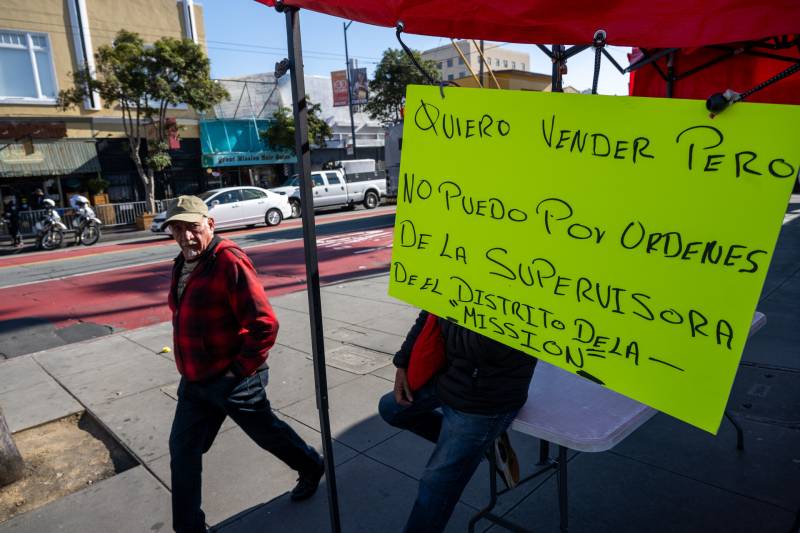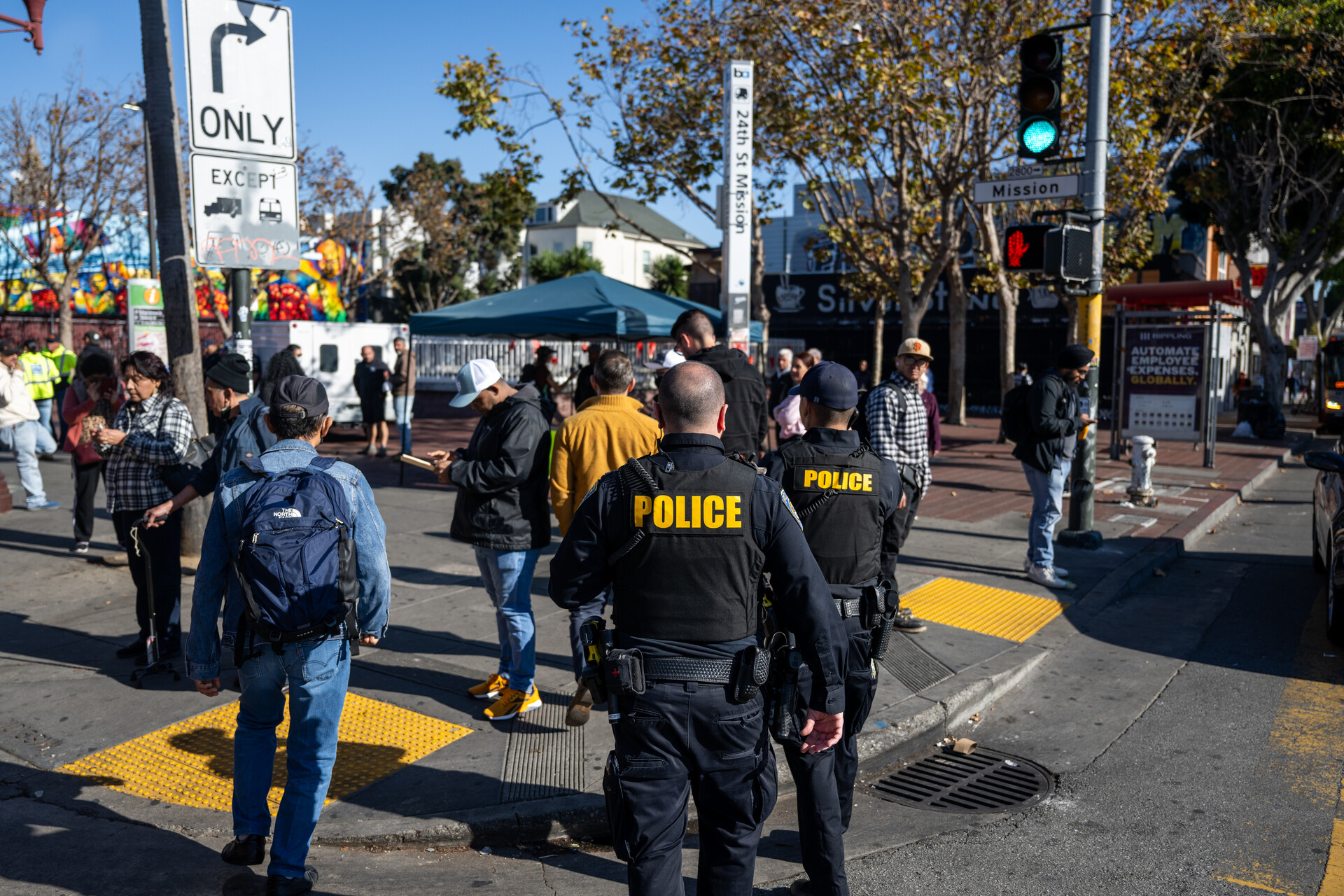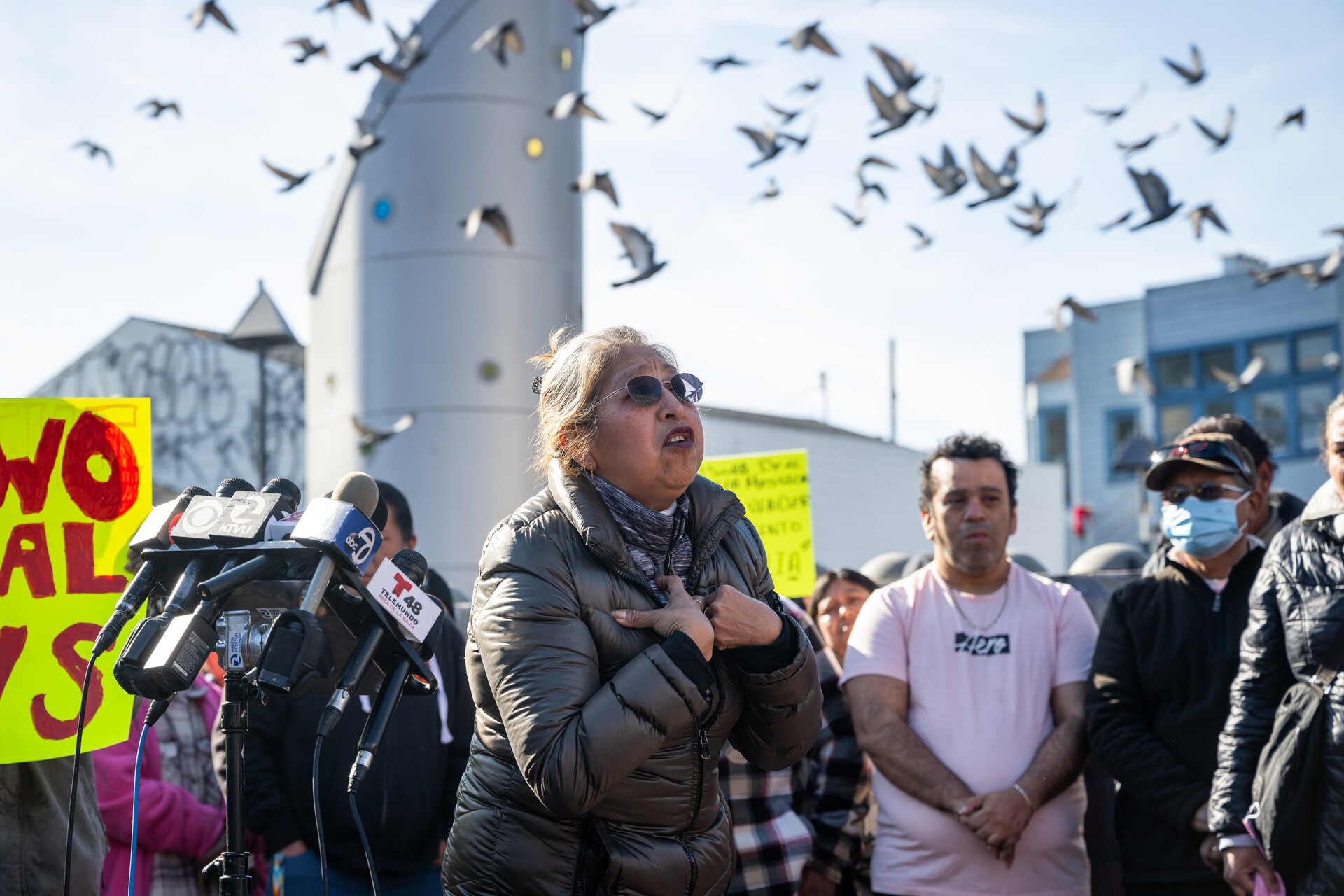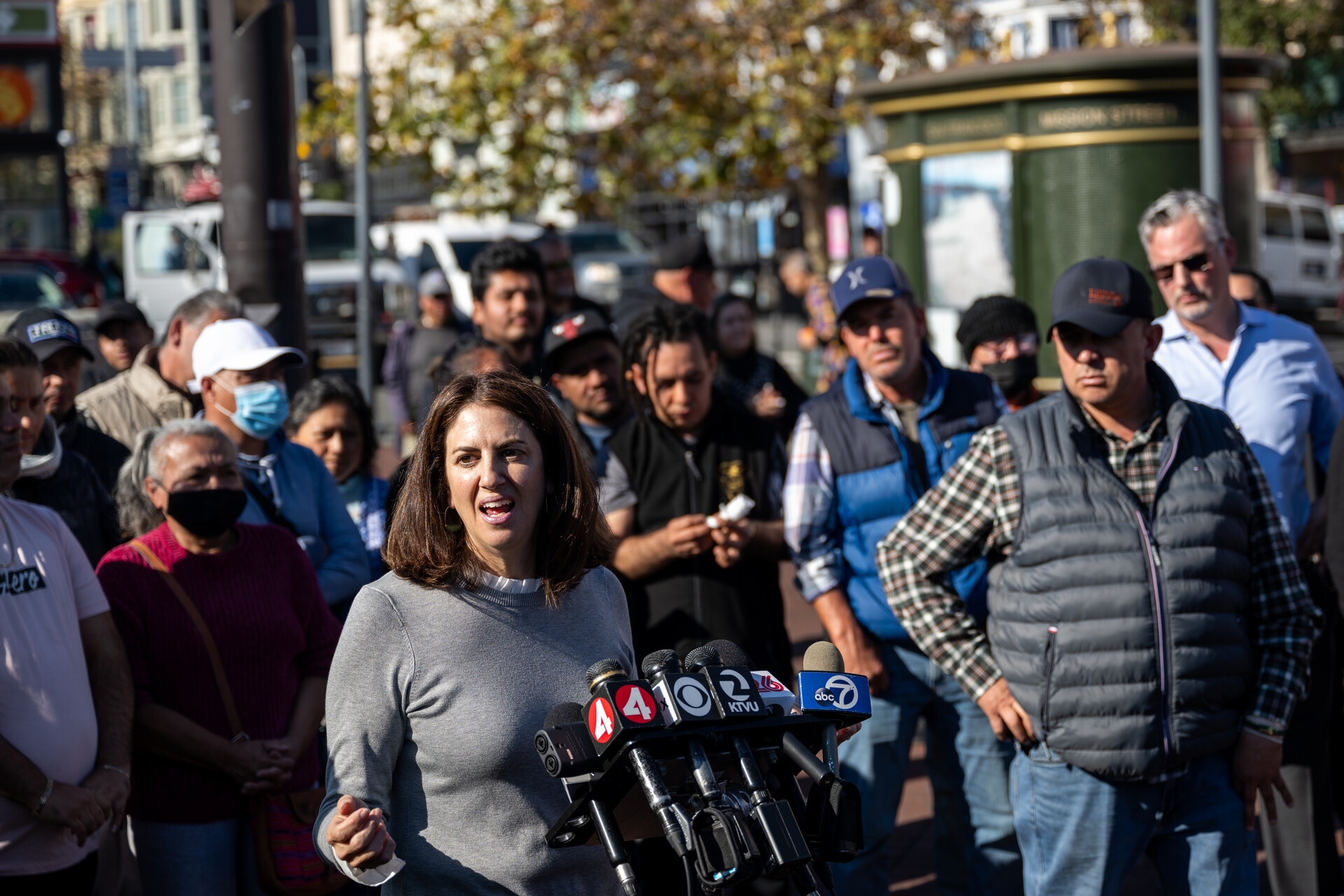Street vendors in San Francisco’s Mission District are urging Mayor London Breed and Supervisor Hillary Ronen to postpone a street- vending ban — that began on Monday — until after the holiday shopping season.
On First Day of Mission Street Vending Ban, Vendors Implore City to Reconsider

The 90-day rule, which prohibits street vendors from selling goods within 300 feet of Mission Street between 14th and Cesar Chavez streets, marks the city’s latest attempt to crack down on illegal transactions, retail theft and violent crime near the neighborhood’s BART plazas.
But, at a rally on Monday afternoon, a group of street vendors and community advocates said the ban comes at the busiest time of the year and will be a major gut punch to the more than 100 permitted vendors in the neighborhood, most of whom are lower-income immigrants struggling to make a living.
“We’re working hard, without selling things that one shouldn’t be selling,” José Barajas, a permitted vendor who has been selling flowers in the Mission for more than 20 years and is part of the Mission Street Vendors Association, said in Spanish at Monday’s event. “We’re selling things the right way. They want to remove us because of other problems that we do not have.”
Relocating even a block or two away from his usual spot near the 24th Street BART plaza could really hurt his sales, Barajas added. As he spoke, eight motorcycle police officers stood guard on that stretch of sidewalk, devoid of the street vendors that normally set up shop there.

Gladys Maigua, another Mission Street vendor who spoke at Monday’s rally, emphasized that December is the most important and profitable month for most vendors.
“We’re hardworking, honest people. We’ve complied with all the laws, the requirements that the city has given us,” she said in Spanish. “This is our request: that we want to keep working this December.”
Three San Francisco Public Works department crews — each accompanied by two police officers — plan to monitor this stretch of Mission Street through Feb. 24 from 9 a.m. to 8 p.m., Monday through Friday, and 8 a.m. to 4 p.m. on Saturday and Sunday, Rachel Gordon, a spokesperson for the agency, said in an email to KQED.
Anyone found vending in the off-limits areas during those times will first be issued a verbal or written warning, with repeat offenders subject to potential fines ranging from $100 to $1,000, Gordon said. Inspectors also can impound the items being sold.
“We need to disrupt the dangerous conditions around unpermitted vending and create a safer neighborhood for residents, small businesses, and our permitted street vendors,” Mayor London Breed said in a press announcement about the changes.
On Monday, the city also announced that space in two nearby marketplaces will be made available starting this week for permitted street vendors to sell their goods while the ban remains in effect. Tiangue Marketplace (on Mission Street between 17th and 18th streets) will be open daily from 10 a.m. to 6 p.m., and La Placita (on 24th between Capp and Lilac streets) will be open Tuesday through Saturday from 10:00 a.m. to 6 p.m., the city said.
Three Mission-based nonprofits — Calle 24 Latino Cultural District, Clecha, and the Latino Task Force Resource Hub — will help oversee the temporary marketplaces.

The city is paying about $150,000 per month to rent the two spaces, and marketplace stalls are free for permitted vendors, said Supervisor Ronen, a strong proponent of the ban, whose district includes most of the Mission District.
Ronen, who spoke at Monday’s rally, said multiple stalls at both marketplaces were still available and encouraged vendors to apply for them, adding that the city would consider opening a third site if more space is needed. She also urged people to do their holiday shopping at the new temporary sites, emphasizing that the program’s success will depend on community support.
But, unlike most other speakers at the rally, she did not support postponing the ban.
“The problem with vending on Mission Street is not these people behind me,” Ronen said, referring to the vendors at the rally. “The problem is that there is another element of stealing and selling stolen goods, and it has become dangerous here.”
Conditions have gotten so dangerous near the two Mission BART stations that Public Works employees now don bulletproof vests when checking for vending permits, Ronen said, noting that she receives daily calls and emails from her constituents imploring the city to crack down on illegal street activity in the area.
But despite demands from vendors to stave off the ban until the new year, it’s highly unlikely the city will delay the plan now that it’s in effect. Ronen said that her office will meet with vendors and other city agencies to evaluate the impacts of the temporary ban and determine the next steps.
The mayor’s office will also host a resource fair to help vendors with other entrepreneurship opportunities and provide additional immigration, health and housing support, Breed said in the press statement.
“We want to support people who are trying to make a living and following our permits and guidelines, and these new spaces and support will do just that,” Breed said. “This is about helping the entire Mission community and making sure that merchants, residents, and City workers feel safe and that the neighborhood can thrive.”
California lawmakers decriminalized street vending in 2018. But as complaints over sidewalk safety increased, San Francisco officials created a new system last year allowing vendors to apply for permits. In the online application, vendors must agree to only sell items that they have legitimately procured. In most cases, the city has waived the $430 application fee to encourage more participation.

In July 2022, before that permit process launched, BART erected fences around the 24th Street BART Plaza — over which it has jurisdiction — to steer vendors onto the sidewalk where Public Works employees could then cite and force them to move. The approach was met with fierce criticism from vendors and community members who said it did little to resolve issues of crime and stolen goods while making it harder to simply pass through the otherwise bustling, vibrant cultural center. Less than two months later, after protesters repeatedly tore down the fences, BART abandoned the plan.
However, several months ago, in late September, BART erected similar temporary barricades around the 16th Street BART plaza to deter street vending.
George Brown, 27, who grew up in San Francisco, said he has a street-vending permit to sell refurbished household items, which helps supplement his income as a desk clerk at a nursing home.
“There’s been a lot of anger because they made us get these permits, go downtown and fill out paperwork, and then blame everybody for the crime that’s happening,” Brown told KQED at Monday’s press event. “It’s just like all that work for nothing.”